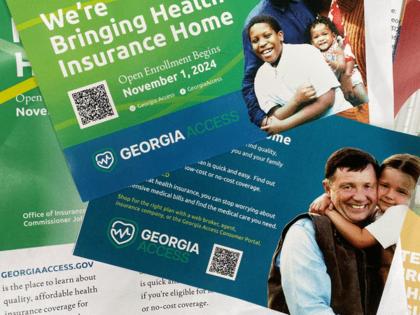GOP House bill lays groundwork for thousands of Georgians to lose insurance
Published in Health & Fitness
ATLANTA — Congressional Republicans’ proposed cuts to health care, unveiled this week, lay the groundwork for thousands of Georgians on subsidized private insurance plans under the Affordable Care Act to lose their coverage and go uninsured.
Some of the cuts are made directly in the bill, such as revoking ACA insurance from about 21,000 Georgia DACA recipients, called “Dreamers”; or permanently shortening the open enrollment period.
Those direct changes alone are estimated to lead to 1.8 million Americans losing insurance.
“Frankly, this is going to make it harder to get and stay enrolled in coverage,” said Laura Colbert, director of Georgians for a Healthy Future, which oversees a “navigator” program to help residents sign up for ACA plans.
The ACA exchange in the Peach State is known as Georgia Access.
The bill omits any mention of extending extra ACA subsidies that are set to expire in December. If they do expire, more than 300,000 Georgians will lose coverage and go uninsured, according to an independent estimate from the left-leaning Urban Institute.
The Congressional Budget Office did not break down its estimate by state, but said the national figure is 4.2 million people would lose their insurance if ACA subsidies expire.
One of the bill’s biggest changes is work requirements for Medicaid recipients, which has little impact in Georgia where that requirement was pioneered two years ago. Overall, the proposed Medicaid cuts would leave at least 7.7 million Americans without health insurance, federal budget estimators said.
Taken together, that’s 13.7 million people nationwide.
However, experts say the Medicaid changes would still likely have some impact in Georgia.
There is a provision that could result in requiring a state’s aged, blind or disabled beneficiaries who are on both Medicare and Medicaid to renew their paperwork more often.
Researchers at Harvard and the University of Pennsylvania said that simply increasing that bureaucracy would cost some Medicaid-eligible Georgians their insurance because they won’t be able to manage the paperwork.
Health researcher Cynthia Cox said if the Medicaid and ACA changes go into effect, they would lead to “probably one of the biggest increases that we’ve seen in decades … in the uninsured rate.”
Republicans say they are simply attacking waste, fraud and abuse.
“We are not kicking anyone off of Medicaid,” U.S. Rep. Buddy Carter of Georgia said. “The Democrats are fearmongering. What we want to do is we want to save, we want to stabilize, sustain.”
Democrats are slamming the bill.
“Trump and the congressional Republicans promised they would not cut Medicaid benefits or strip away people’s health care,” said U.S. Rep. Frank Pallone, the top Democrat on the committee that will hear the bill Tuesday. “They lied. This does just the opposite.”
The Congressional Budget Office estimates the changes would result in savings of up to $715 billion over 10 years. The ACA changes could save another $335 billion in the same time frame, according to estimates.
Republicans want the cuts to help offset the planned extension of tax cuts passed during Trump’s first term in office, as well as additional tax breaks he’d like to add.
The budget cuts would not pay for all the tax breaks, which are estimated at $4.5 trillion over 10 years, and this week Republicans proposed raising the nation’s debt ceiling by another $4 trillion.
Georgia has seen skyrocketing growth among ACA policyholders in recent years — from 463,000 in 2020 to 1.5 million in 2025. Because of that, Georgia is “one of the states with the most to lose,” Cox said.
That ACA surge happened more acutely in states like Georgia that did not expand Medicaid to all their working poor, instead allowing those low-income people access to the ACA exchange.
The pandemic aid, called “enhanced subsidies,” were always written to expire at the end of 2025, but their popularity has resulted in calls for an extension. Cox originally expected the debate to happen in September, but has doubts now, she said.
The estimates of people losing insurance may grow.
GOP committee leaders unveiled their plan late Sunday night, and said they intend to put it up for a vote with discussion starting Tuesday afternoon. The federal estimators at the Congressional Budget Office said they worked fast and the estimates were bare calculations, and likely to rise as they continue working in more detail.
_____
©2025 The Atlanta Journal-Constitution. Visit at ajc.com. Distributed by Tribune Content Agency, LLC.










Comments